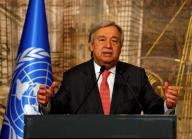Reuters
By Patrick Markey and Samia Errazzouki
The United Nations Security Council unanimously backed attempts to restart talks between Morocco and the Polisario independence movement over the Western Sahara conflict, and extended its peacekeeping mission there for another year.
The resolution came after the U.N. mission confirmed the Polisario had withdrawn troops from the Guerguerat area of the territory, a vast swath of desert bordering the Atlantic Ocean that has been contested since 1975.
They had faced off in Guerguerat since 2016 with Morocco, which pulled its forces back earlier this year.
U.N. Secretary-General Antonio Guterres earlier this month called for Morocco and the Polisario Front, which fought a war over the region until a 1991 ceasefire, to enter new negotiations that would include proposals from both sides.
“This action should improve the prospects of creating an environment that will facilitate early implementation of Mr. Guterres’s determination to relaunch the negotiating process,” the U.N. spokesman said in a statement noting Morocco’s early pullback and confirming Polisario’s withdrawal.
Morocco claimed Western Sahara after colonial Spain left, but Polisario fought a guerrilla war for independence for the Sahrawi people there until the U.N.-backed ceasefire.
U.N. talks have long failed to broker an agreement on how to decide on self-determination. Morocco wants an autonomy plan under Moroccan sovereignty. But Polisario wants a U.N.-backed referendum including on the question of independence.
The U.N. resolution on Friday extended the U.N. peacekeeping mission, known as MINURSO, until April 30, 2018 and called on the parties to resume a fifth round of talks.
Against a backdrop of decades of past political failures and mistrust, the resolution noted Morocco’s 2007 autonomy proposal and welcomed Rabat’s “serious” efforts to progress.
It also emphasised Polisario’s 2007 proposal, which calls for a referendum between independence, integration with Morocco and self-governance.
Past attempts to broker a deal have been fallen apart over details mostly on referendum terms, including who should be allowed to vote.
REGIONAL HOPES
Morocco’s foreign ministry said in a statement the kingdom was satisfied with the resolution, and hoped for a “real process” toward a solution, which it said should be the autonomy initiative.
Morocco also called for neighbouring Mauritania as well as Algeria, which backs Polisario and maintains tense relations with Rabat, to be involved in negotiations.
“All parties must assume their responsibilities, Algeria must assume its responsibility,” Foreign Minister Nacer Bourita told reporters in Rabat. “Algeria is the missing key.”
That position has in the past been rejected by Polisario which sees the conflict only between itself and Rabat.
Algeria’s Foreign Minister Ramtane Lamamra on Saturday called the resolution a victory for the Sahrawi cause that put the process “back on track”, according to the APS state news agency.
The dispute also reflect splits in the security council. France backs former colony Morocco, and Polisario’s self-declared Sahrawi Arab Democratic Republic has been supported by some non-permanent council members and South Africa.
Friday’s UN resolution noted the need for more support for Sahrawi refugees who fled the conflict and have since lived in camps in the south of Algeria.
Since the 1991 ceasefire, the region has effectively been split by an earthen wall separating an area controlled by Morocco that it claims as its southern provinces, and territory controlled by the Polisario with a U.N.-mandated buffer zone between them.
U.N. peacekeepers intervened in a standoff last year after Moroccan forces crossed beyond the earthen wall in Guerguerat near the Mauritania border and Polisario responded by dispatching troops to the area.
(Additional reporting by Michelle Nichols in New York; Editing by Toby Chopra and John Stonestreet)







